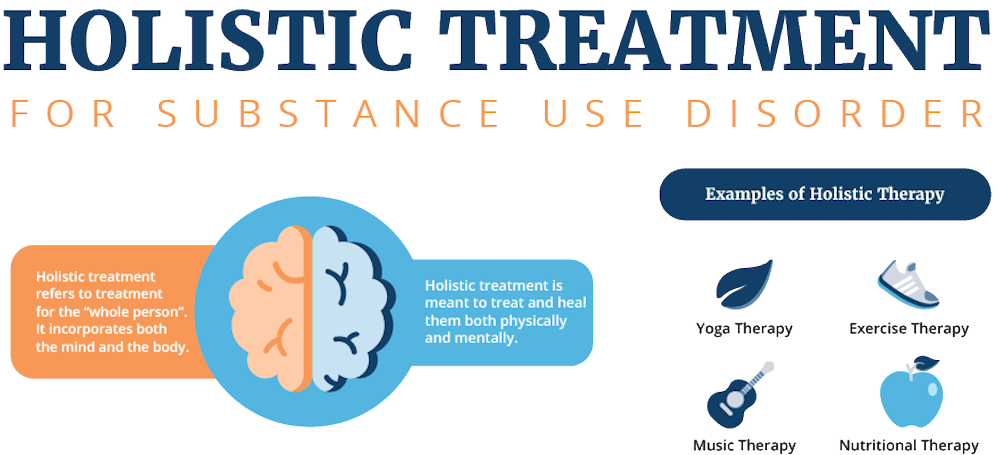Holistic Addiction Treatment
Holistic Recovery Options
At Discovery Institute, we strive to create the best-individualized treatment plan for all of our clients. We recognize that many times, alternative therapies can be equally as effective as regular therapy and medication. The goal of our holistic substance abuse treatment program is to heal the body, mind, and spirit.
Our treatments include nutrition counseling, light physical activity, yoga, and emotional counseling. The goal is to get people to become more in tune with themselves, and find meaning in their lives. Many of these programs work to nurture the client’s body and create self-love that may have become lost in their addiction.
What Is Holistic Care?
The term “holistic” refers to the whole person (mind, body, and soul). It simply means this method of treatment seeks to treat all of these areas. Holistic care is gaining popularity due to its effectiveness when used in conjunction with more traditional treatment methods.
The fact that you’re here means you are likely struggling with a substance use disorder. If you believe that you’re addicted to drugs or alcohol, you are in the right place.
Holistic addiction treatment is very natural. In such a disconnected age, there is a lot of effectiveness to being present, being mindful of the now, and being able to focus intently on the self. 4 out of 10 patients are seeking alternative medicine, and that trend is only growing.
In general, an addiction treatment facility that utilizes holistic care will design treatment to integrate a medical, physical, and spiritual model. This approach will then be used as a comprehensive treatment for patients. We will be detailing the specifics more below; but for now, a few holistic treatments are massage therapy, acupuncture, reiki, yoga and meditation, bio/neurofeedback, tai chi, and herbal medicines.
Types of Holistic Addiction Treatment
Holistic approaches aim to help improve the whole person by targeting one of six areas:
- Mental health
- Physical health
- Emotional health
- Spiritual health
- Nutritional health
- Environmental surroundings
Many holistic therapies overlap in a few of these areas and provide added support to any traditional treatment options. It is often recommended that individuals engage in a few different holistic therapies to determine what they enjoy most. It’s important to remember that when trying holistic treatments keep an open mind and focus on the present moment. The goal of a treatment program is to find recovery. Effective treatment is only an option if you’re actively engaged and working with the treatment center to find the best ways to overcome addiction.

Yoga
Yoga and meditation have been gaining popularity recently and for good reason. They are incredibly beneficial to our minds, bodies, and spirituality. Each of these two practices incorporates three dimensions of holistic treatment: mind, body, and spirit.
Hatha Yoga is a type that is frequently practiced in the West. It focuses on various breathing techniques and maintaining focus on the body. Yoga does this with the intent of achieving therapeutic effects like reducing stress.
Many people are unaware of how physically straining yoga can be; oftentimes, it is more of a workout than weightlifting! But, for those who dislike exercise, do not fret. It’s not straining traditionally, although it is hard work. There are many recent trends to try “hot yoga.” This is yoga in a sauna, which is both extremely taxing and relaxing for the body.
Hot yoga is a perfect example of the almost paradoxical appeal that only yoga can offer; straining and relaxing the body all at once. Along with this, exercise has been proven to produce more endorphins thus enhancing addiction treatment.
Meditation
 Meditation focuses inward without outer pressures, the focus required on the body and mind, whilst enduring the pressure, has been proven to have emotional, mental, and physical benefits. Also, it is helpful to manage stress and other triggers like, depression, anxiety, and self-harm. Having a calm mind and mental stability are the strongest weapons to prevent relapse.
Meditation focuses inward without outer pressures, the focus required on the body and mind, whilst enduring the pressure, has been proven to have emotional, mental, and physical benefits. Also, it is helpful to manage stress and other triggers like, depression, anxiety, and self-harm. Having a calm mind and mental stability are the strongest weapons to prevent relapse.
Meditation, on the other hand, has a different effect. There has been much research on the brain and meditation. As a result, it’s been discovered that the brain produces a similarly “natural high” when meditating, as it does when engaging in substance abuse. The difference is there is no dependency or withdrawal. Thus, this is a healthy way to achieve a “high.” It activates the prefrontal cortex in similar ways.
Another reason why meditation is so beneficial is that it elicits the same brain waves that doctors use to treat addiction. In a study, 77% of those in addiction treatment were fairly successful due to meditation. Third, meditation requires you to control your urges and restore balance. Meditation focuses on emptying the brain of thoughts, so when a thought pops up, we must control the urge to ponder it. Having mastered this, we are better suited to combatting temptations, and urges, and avoid relapse.
What is Reiki?
Reiki is a form of energy-transfer, holistic therapy. It focuses on the transfer of energy using the laying of hands. It is a very spiritual experience and is a rising trend in alternative therapy. While small studies have shown it reduces minor pain, no large studies have been conducted. That being said, there is a large number of followers who insist reiki has helped them to improve their mental health, physical health, and emotional issues.
According to practitioners, there are certain flows of energy through the body, and injuries caused these energies to be blocked. The release of flow for these energies provides relief from the pain, enables relaxation, and reduces stress. Practitioners also believe that free-flowing energy can lead to quicker recovery and reduce symptoms of illness. This energy healing targets the energy centers of the body. Consider Reiki in seeking holistic addiction recovery options.
What is Acupuncture?
A smooth segway from Reiki onwards is acupuncture. Similar to Reiki therapy, acupuncture focuses on the energy centers of the body. It is (in simple terms) the practice of piercing the body on specific energy centers with needles. There is not a large amount of scientific study on acupuncture. But it is one of the most widely used alternative therapies in the world. Whole countries swear by it and assert it has many useful benefits (specifically for those who struggle with addiction).
Acupuncture has some of the following benefits:
- Migraine relief
- Chronic pain reduction
- Anxiety relief
- Insomnia reduction
If you have noticed, all of these are associated with withdrawal effects of substance abuse and drug addiction. Acupuncture’s followers insist that acupuncture is a natural way to relieve addiction withdrawal symptoms. Doing this is a very helpful, natural, and holistic approach to improving your well-being. Like reiki therapy, acupuncture therapy operates by relieving the body’s energy flow for a natural improvement in our lifestyle.
Acupuncture can be a helpful method in addiction recovery, and reducing withdrawal effects. It can also assist people in managing triggers. Finally, acupuncture therapy can help to improve your mind, body, and emotional state.
Nutritional Counseling
It’s common knowledge that what we put into our bodies has a profound effect on how we feel and function. Nutritional therapy tries to tackle this by helping us to eat better to feel better. One of the many symptoms of addiction could be weight loss or weight gain. In addition to this, extreme eating habits (or lack thereof) are also a symptom of mental illness or dual diagnosis. This is also a way in which nutritional therapy can help tackle addiction. A nutritional therapist will try to get you in touch with your healthiest self. This will be done by providing you with meal plans, assessing your eating, and monitoring your emotional state throughout this process.
All of this to say, we should not put unneeded pressure on food or our bodies when going through holistic addiction treatment. If diet culture leads you to feel shame, guilt, or develop an eating disorder; perhaps dieting is not for you. Nutritional therapists are trained professionals who are skilled in making sure you eat in a way that helps you improve and maintain a healthy lifestyle.
CONTACT US
Find out how we can help
Our compassionate counselors are standing by to answer any questions you may have. After helping thousands of people over the last 50 years, we have the resources to help you and your family and all your individual needs.
Going Into Nature
 Another type of holistic addiction treatment is experiencing nature. In a world that is always online, behind a screen, or streaming, it can be extremely refreshing to get outside and experience the natural world. Going on hikes, jogs, or swimming are all great ways to pursue a holistic look at exercise, and being in nature is another proven method of increasing happiness. This leads some to take “nature baths” where you allow yourself to fully appreciate the great outdoors.
Another type of holistic addiction treatment is experiencing nature. In a world that is always online, behind a screen, or streaming, it can be extremely refreshing to get outside and experience the natural world. Going on hikes, jogs, or swimming are all great ways to pursue a holistic look at exercise, and being in nature is another proven method of increasing happiness. This leads some to take “nature baths” where you allow yourself to fully appreciate the great outdoors.
Maybe camping is not for you, or maybe it is. Either way, whatever you enjoy; you should give experiencing nature a shot. Incorporating other aspects of holistic treatment alongside nature is extremely helpful as well. Maybe you like to exercise: then get off the treadmill and hit the trail. Or, perhaps you like yoga? Try taking a yoga class outside next time. Or maybe you live by the beach? Take a morning and meditate by the waters. Being in nature is a great way to shape our bodies, produce endorphins, and improve our mental states all at the same time.
Art Therapy
Art therapy is a holistic therapy that allows people an outlet for self-expression. Individuals will utilize different mediums to create artwork. Art therapy can include drawing, painting, sculpting, or coloring. This holistic approach allows individuals in addiction recovery a creative outlet to express feelings they may otherwise have difficulty communicating. This can be extremely helpful to counselors and medical staff as they can gain insight into how someone is truly feeling.
Art therapy allows people to feel more empowered and productive. This form of holistic addiction treatment has been utilized since the 1940s as its shown to help increase lasting recovery. People gain more self-confidence, relieve stress, and improve symptoms related to anxiety and depression.
Does Holistic Treatment Work?
 Holistic treatment programs are extremely beneficial when used in conjunction with traditional addiction treatment programs. It’s important to remember that holistic therapy (while beneficial) is only a portion of a well-rounded treatment plan. To fully recover from addiction, you will need to enroll in an inpatient or outpatient program.
Holistic treatment programs are extremely beneficial when used in conjunction with traditional addiction treatment programs. It’s important to remember that holistic therapy (while beneficial) is only a portion of a well-rounded treatment plan. To fully recover from addiction, you will need to enroll in an inpatient or outpatient program.
The conventional treatment provides access to evidence-based approaches like individual and group therapy. You’ll also have access to drug addiction education and more standard therapies that are proven to be effective. Holistic treatment approaches complement traditional treatment.
Contact the Discovery Institute of New Jersey
Are you struggling with a substance use disorder? Perhaps holistic treatment is the best approach for you. Through this type of treatment, you may be able to successfully overcome and remain free from substance abuse!
We want to help you seek the best substance abuse treatment you can get. If you or a loved one is suffering from substance use disorder, it is time to seek help. We at the Discovery Institute know that recovery is a long journey. However, with holistic recovery options, a great community, and specialized care; it doesn’t seem so far. It is not too late to take your life back. Please contact us today for more information.


